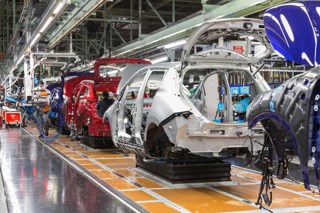After recent dire results for Mitsubishi - notably a £1.3bn loss for the last quarter - the firm has decided to focus on faster growing, more profitable markets.
As a result of its ‘small but beautiful’ business model, it has said that it will abandon growth as a strategic goal and will focus on minimising costs and maximising profit, with the aim of cutting costs by 20% over three years.
The firm is effectively pulling out of Europe to focus on the likes of South Asian markets. As a result, it won’t introduce any new models into European markets or develop models specifically for Europe.
The firm had sold its European manufacturing operations at the Nedcar Netherlands plant back in 2012 (the plant now makes Minis and BMW X models). Mitsubishi then imported cars to Europe, selling around 150,000 cars in the region in 2019 pre-pandemic. In June this year the firm took just under 1% of the European Union/EFTA/UK market.
In future, new Mitsubishi models will be targeted at the South-East Asian market in an attempt to boost its market share there from around 6% to 11%. The brand was hammered in the region in the first quarter of 2020, with its sales down by over two-thirds. Globally Mitsubishi sold 139,000 cars in the April-June 2020 quarter, down by over 50% from the same period in 2019.
Along with a gradual wind down of its European and UK market presence, the firm will cut costs by reducing R&D spend (never a good sign), undertaking ‘salary reviews’ (read cutting wages) and shutting its plant at Sakahogi in Japan by 2021, with plans to shift some of the models made there to the firm’s Okazaki plant.
Planned new models that the EU & UK will miss out include a new Outlander SUV and a new Battery Electric SUV (2021), a plug-in hybrid Outlander and L200 Pick up (2022), and the Xpander MPV and Pajero Sport SUV (2023).
Mitsubishi’s current range will remain on sale in the UK and Europe while they comply with emissions regulations (although new Euro 7 regulations will soon be an issue) and as long as there is enough stock.
The UK dealerships – operated by the Colt Car Company (CCC) - will still offer after sales services, parts and servicing.
CCC is thought to have around 15,000 cars in stock, and appears to have been surprised by Mitsubishi’s move.
The New Alliance
Back in May, the Renault-Nissan-Mitsubishi Alliance unveiled a post-Ghosn plan to cut costs through closer collaboration. This aims to cut investment costs per vehicle model by up to 40% through more use of common platforms and parts. The plan put different members in charge of different regions, vehicle development and technology, using a ‘leader-follower’ scheme.
Mitsubishi has effectively been first out of the blocks amongst Alliance members in focusing on South East Asia – the firm’s core region allocated in the Alliance strategy. Increasingly, Mitsubishi will look to use electric powertrain technology and semi-autonomous capability from its Alliance partners Renault and Nissan.
From a consumer point of view the pull out is a great shame as the firm has pioneered plug in hybrid technology in the UK and Europe, for example in its Outlander model. That technology will probably find its way into new Alliance models from Renault and Nissan.
While the Alliance Plan had anticipated a refocusing by Mitsubishi on South East Asia, I'm still surprised that Mitsubishi is effectively leaving the UK/EU market completely - I had anticipated Mitsubishi models being assembled off the same platforms as Renault and Nissan models, and produced for example at Sunderland, so as to maximise Alliance market share in the region.
That's off the agenda for now, although I wouldn't rule out the brand being resurrected in the UK market in this way at some point in the future.
Perfect Storm – where next?
Remember that the Alliance had fundamental challenges even before COVID-19 hit, in the wake of the Ghosn affair. And Covid has added to auto industry woes to bring a ‘Perfect Storm’, with supply chains disrupted, assembly closed down and car dealers shut for months.
The economic damage from the virus will likely mean a 20% hit to car sales globally this year. That’s pretty devastating for an auto industry already beset by challenges and having to invest heavily in new technologies.
A looming issue is how the major carmakers will respond to the crisis, as they will face a big cash squeeze as consumers postpone purchasing cars.
The crisis comes at a time when international auto markets had anyway been slowing or stagnating, while at the same time car firms are having to invest huge amounts on a raft of new technologies, especially electric vehicles (EVs). A big squeeze is effectively playing out, and scale is seen as increasingly important for car firms.
So the auto shut downs will weaken firms and push them further to merge and consolidate. Auto firms will review investments and what models they produce and sell, and where. Mitsubishi’s decision to pull out of Europe is a reflection not only of Alliance tensions but also of these wider industry challenges.
Expect more disruptions to come.
Author: David Bailey is Professor of Business Economics at the Birmingham Business School and Senior Fellow at the UK in a Changing Europe programme



















Login to comment
Comments
No comments have been made yet.